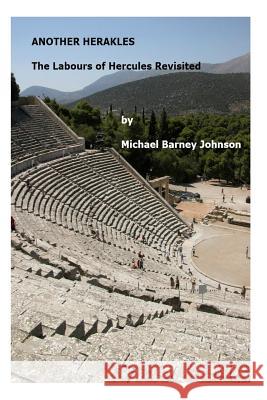Another Herakles: The Labours of Hercules Revisited » książka
Another Herakles: The Labours of Hercules Revisited
ISBN-13: 9781494762650 / Angielski / Miękka / 2014 / 248 str.
This book is set in ancient Greece, and the events are recounted in the first person by Alkaeus, a youngster "on the threshold of manhood." He introduces himself, his environment, his period in history - and his story; and through him we enter the atmosphere of a different country and a different time. The book deals with the Twelve Labours of Hercules - or Herakles in Greek - and focuses on these tasks in the context of the friendship that develops between Alkaeus and a stranger, Rhekleas, who comes to the village to take up employment with Lydia, a wealthy landowner. Alkaeus is fascinated by the achievements of his great hero, and in the course of their conversations together Rhekleas helps his young friend towards a greater understanding and new interpretations of the tasks that Herakles had been set. The Labours as retold and reinterpreted are "deconstructions" of the legends and therefore run the risk of disillusioning the young Alkaeus (which they do on occasion), but which also help to educate him so that he acquires a realistic and adult perspective on the legendary hero. Generally speaking, the names have been Hellenised, that is, given in their transliterated Greek forms, even though we are more used to the Roman names (as, indeed, with the name Hercules itself). This has been done in an attempt to lend authenticity to the story. For this reason also the language is intentionally different in style, pretentious even, but it is a mechanism both for avoiding completely all modern cliches and for creating the impression of a different language being used originally - almost as if this book were a translation from an original Greek version. According to the tradition, Herakles was born to Alkmene, the granddaughter of Perseus, following her seduction by Zeus, the chief god. On account of this, and not for the first time, Hera, Zeus's heavenly consort, was possessed by jealousy. Zeus undertook to make the next son born to the house of Perseus king of Greece. Through a trick of Hera's, the first-born of twins was Eurystheus. He it was therefore who became king. Herakles was the second-born twin. The legend goes that Herakles first wife was Megara, a princess of the blood royal, but he murdered both her and their children in a fit of madness visited on him by Hera. As Rhekleas explains more fully in the course of his conversations with Alkaeus, it was this act which led him to become his twin brother's constant slave during the twelve years in which Herakles accomplished the Labours. He had, therefore, to contend not only with his brother's demands, but also with being plagued by the malicious tormenting of the ever-jealous Hera. Indeed, it was she who, while Herakles was still in his cot, dispatched two serpents to kill the infant Even though the Labours themselves are familiar to many, Herakles had a life after them. It is recorded that he either went insane or feigned insanity, and left for a distant town where he sold himself into slavery and worked performing menial tasks for a rich landowner. A therapeutic retreat, perhaps? There is a confusion in the mind of Alkaeus as to the relationship between his friend Rhekleas and the hero Herakles..."
Zawartość książki może nie spełniać oczekiwań – reklamacje nie obejmują treści, która mogła nie być redakcyjnie ani merytorycznie opracowana.











